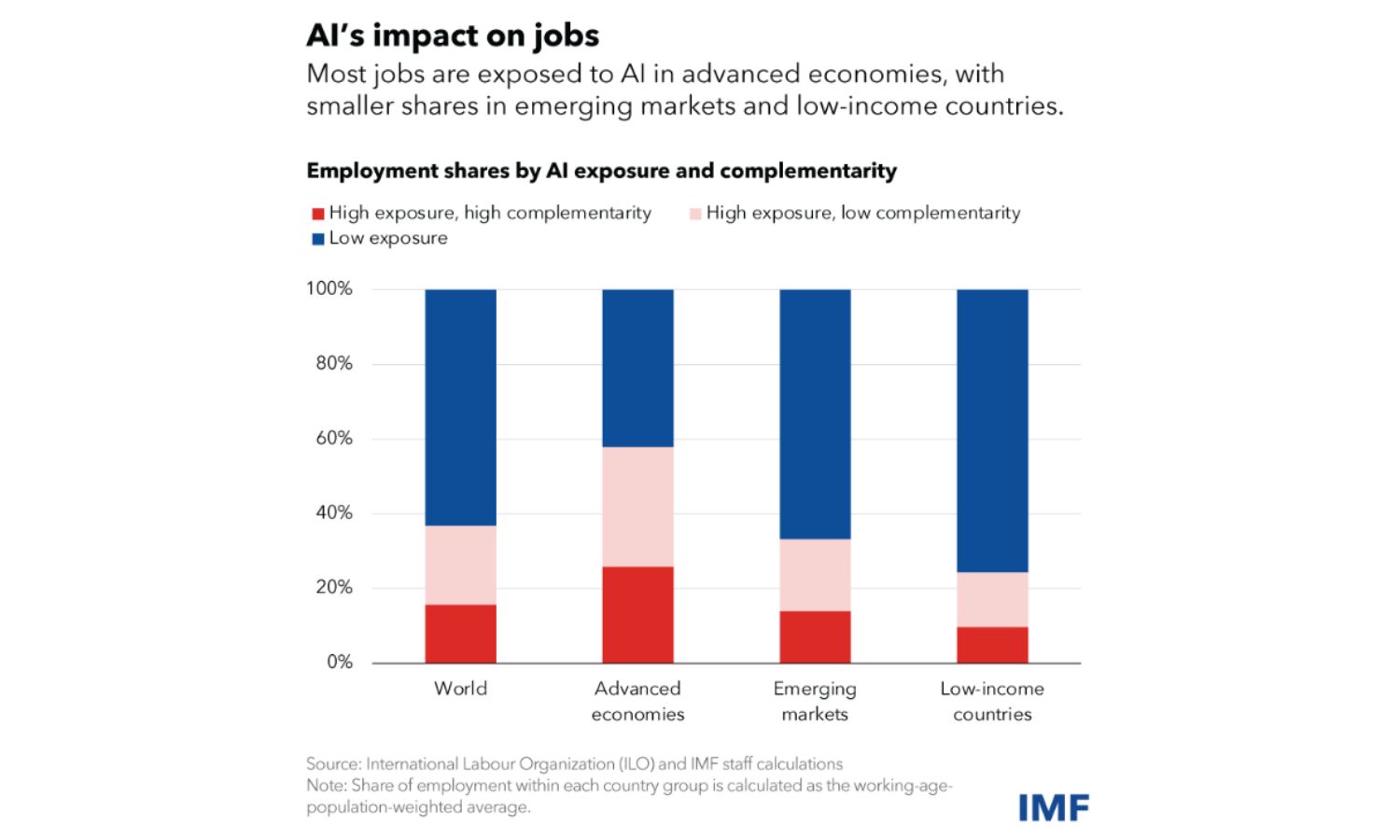If you thought you could ignore or escape the rise of artificial intelligence, think again. Almost 40% of jobs worldwide — and up to 60% in developed economies — will be impacted by AI, according to a new analysis by the International Monetary Fund.
In an ominous warning over the need for “a careful balance of policies,” the IMF’s Managing Director Kristalina Georgieva has said that AI is likely to replace jobs and deepen inequality.
At the same time, Georgieva notes that the technology could “jumpstart productivity, boost global growth and raise incomes around the world”.
“We are on the brink of a technological revolution,” she has said, with the report likening the impact of AI to the Industrial Revolution.
The report comes as world leaders gather for a meeting of the World Economic Forum in Davos, Switzerland. AI regulation and impact, along with growing geopolitical tensions and poor economic outlook, is set to be a key topic of debate.
The IMF has positioned the world as on the edge of a precipice when it comes to AI. With strong regulation and adaptation practices, AI could be of great benefit to most. Without such action taken right now, worse-case scenarios are likely to play out.
About half of all jobs that will be impacted by AI will benefit from the technology, the assessment finds, with the other half to be impacted negatively. Economies with more ‘cognitive-task-oriented’ jobs will see the greatest shifts while only 26% of roles in developing economies will be impacted. This means that while developed nations will see greater disruption, they will also see greater benefits.

Unlike previous waves of automation, AI has the potential to disrupt high-wage earners. Those in jobs with high ‘complementarity’ will likely see an increase in their earnings, while those with high ‘displacement potential’ could be made redundant entirely.
“Countries’ choices regarding the definition of AI property rights, as well as redistributive and other fiscal policies, will ultimately shape its impact on income and wealth distribution,” the report reads.
It’s not the first time that a major investigation into the impact of AI on the labour market has found disturbing results. Goldman Sachs’s own report last year suggested that AI could replace the equivalent of 300 million full-time jobs. However, it too said that new jobs would likely open up in response to the technological advances.
AI is not only forecast to exacerbate income and geographic inequality but educational and generational too. Young people and those with further studies under their belt are expected to be the most able to adapt to the changes while older workers are more likely to struggle.
Broadly, the IMF has declared that now is the time to act given the pace of change. “AI is being integrated into businesses around the world at remarkable speed,” Georgieva has said. The report has ranked 125 nations on how prepared they are for AI adoption, with countries like Singapore, the US, and Denmark coming out on top for preparedness. Nations like Tanzania and Afghanistan are the least prepared.
“Advanced economies should prioritize AI innovation and integration while developing robust regulatory frameworks,” Georgieva advises.
“For emerging market and developing economies, the priority should be laying a strong foundation through investments in digital infrastructure and a digitally competent workforce”.
Regulation of AI began to make serious inroads last year, with China introducing some of the world’s first national policies on deployment and development. In October, the US, pushed its developers to share their safety reports with the government.
The European Union has since reached a provisional deal that would see the first comprehensive, international guidelines on AI use put in place in the region. In November, Australia was one of 29 signatories to the Bletchley Declaration, a commitment to the safe development of AI, following the international AI Safety Summit in the UK.
While the IMF has praised these initial moves, it recommends governments go further. “ensuring social cohesion,” the report states, is of paramount importance as AI increases its reach.
“Policies must promote the equitable and ethical integration of AI and train the next
generation of workers in these new technologies; they must also protect and help retrain workers currently at risk from disruptions,” the report concludes.
“The AI era is upon us, and it is still within our power to ensure it brings prosperity for all”.
Related: Lawmakers in Brazil Have Passed Legislation Drafted by ChatGPT
Related: Prophets of Doom: Here’s What the Experts Have Said AI Will Do to Society
Read more stories from The Latch and subscribe to our email newsletter.







